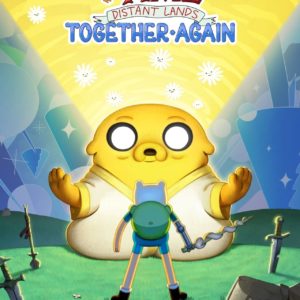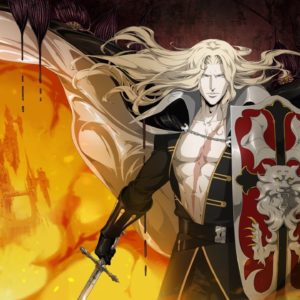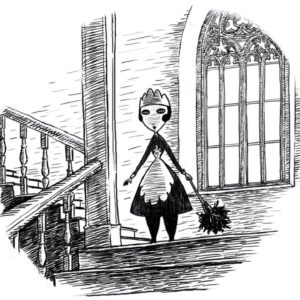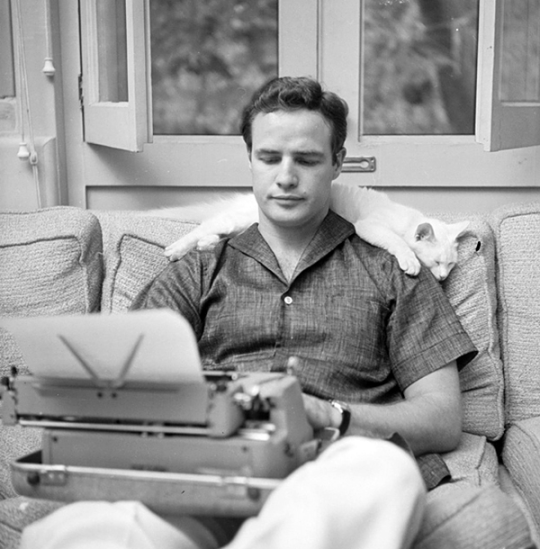
(Although this is clearly a young Marlon Brando, Benjamin insists that it is he. It’s even on his LinkedIn, and nobody has ever fibbed on LinkedIn.)
Benjamin Townsend has written on about a million animated shows and was Story Editor (Head Writer in Charge) and Executive Producer on Bravest Warriors Season 4. He won an Emmy for his work on I Got A Rocket, but he says that it’s chill because everyone in animation has one (mine must be lost in the mail). I sat down with Benjamin to talk Bravest Warriors secrets, how to become an animation writer (step one: knit in public), and revolutionary kindness in cartoons.
How did you break into the cartoon biz?
After graduating uni in the UK, I came to the US on holiday and… decided to stay. About two weeks after I arrived, I met an animation writer at a coffee shop, completely by chance.
How did this ‘chance meeting’ come about?
I was knitting. He approached me and said, “You’re knitting,” so we struck up a conversation. He was teaching an extension course at UCLA on Writing for Animation and invited me to audit (read: “sneak into”) the class. After a few weeks, his agent was looking for an assistant and he recommended me. So I went to work at The Gotham Group, which at the time was a newer agency and much smaller than it is now (note: Gotham is now a premier management company).
Do you recommend starting out at an agency or management company?
Absolutely, because so much of this business is who you know. Point in case, The Gotham Group has managed me for 20 years now. Working as an assistant, I met a whole bunch of people who I’d continue to work with for years to come. It’s a very small industry in that way.
Where did you go after working as an assistant at Gotham?
I put in a few years at Gotham who then connected me with Fox Kids as assistant to a VP of Development. It was an extremely fun time to work there: X-Men, Power Rangers, TMNT – billion dollar franchises. I learned a lot in development that helped me become a writer: how projects are developed, how notes are given, what makes an effective bible, etc.. I also met a lot of writers, which led to my first writing job. The story editor on one of our shows gave me the chance to write an episode. Then another. After a few more, I was able to become a freelance writer full time.
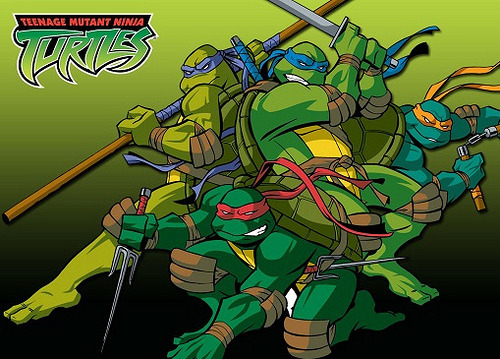
(Benjamin wrote on the 2003 – 2009 TMNT series)
Why do you think he gave you a script – what do story editors look for in baby writers?
They want someone intelligent who they can work with. It’s really that simple. Nice, smart, and dependable. The technical aspects of writing are less important at the beginning, because most can be taught and corrected. So it’s really about having a good personality, a sense of humor, and instincts for story. The nuts and bolts come in the process.
What do young writers need to know about writing for animation specifically?
Animation writing has a visual component to its storytelling that you don’t see in live action. In script-driven shows, the writer is responsible for a lot of the work traditionally done by the board artist. You have to be aware of the camera, the acting, the non-dialogue humor. Often, I read scripts that are focused almost exclusively on tone, characters sitting around ‘being themselves’. But in a scripted show stuff has to happen on the page or it won’t be on the screen.
What are the most important aspects of being a story editor?
Story editors keep continuity. They manage the writers and ensure that the show maintains a level of consistency from episode to episode. If a story isn’t working or something isn’t funny, they are the ones who work with the writer to get it back on track.
As an SE, how does working in a writer’s room vs. with freelance writers differ?
Writer’s rooms for animation are actually a fairly new phenomenon. But in a room, you’re assured that everyone knows the show and is on the same page, and you break the story together. Working with freelancers, there are times when writers don’t know the show as well as they should (not Bravest Warriors writers, obviously), which makes an SE’s job harder. And breaking story is a one-on-one meeting where they pitch an episode idea and if you OK it, you sit down together – or hop on a video chat – to find the story beats.
What do you like best about being a story editor?
Working with funny writers. It’s awesome when a writer makes you laugh or comes up with a great idea you’d never have thought of. Every person’s way of telling a story is different. The hard part for an SE is getting out of the writer’s way: allowing them to use their own voices, while maintaining the voice of the show. It’s a careful balance.
What is your advice to writers trying to break in?
Be distinctive. Have your own voice. It used to be all about how well you can mimic the voice of a show, and while that still matters, there’s more emphasis placed now on what writers can bring to the show individually. In the long run it’s easier to write in your own voice anyway, so develop it. Tell the stories that you want to see onscreen. And don’t emulate whatever is popular, just enjoy what you enjoy. Read a lot, watch a lot, don’t fake it – let your voice authentically reflect who you are.
How do you think that shift has come about, to emphasize unique voices?
I’ve seen it through the influence of creators like Pendleton Ward, Genndy Tartakovsky, Craig McCracken: this move toward artist-driven, board-driven shows that could only be made with that one singular voice guiding the vision. The downside is that the creative process for such shows tends to be slower, and in this age of content, the infrastructure of producers, writers, and a story editor is crucial to getting things on air quickly.
You’re also a producer – how does that compare to writing?
With writing, it’s just you and a script. But producing is all about collaboration. Other minds and visions enter the mix, and you lose the total control of it being just you and the page. It can be challenging to see what you had envisioned change, but producing requires compromise. And anyway, collaboration is integral to making TV and it’s better for it in the long run. The best scenario is when an actor takes your line and makes it so much funnier than it was in your head; or when a board artist adds the perfect visual quirk to enhance a moment.
What is your favorite show you’ve written on?
Bravest Warriors of course.
Naturally. But how ‘bout besides Bravest?
I’ve enjoyed working on shows with legacies. Avengers, TMNT, Scooby Doo. On TMNT, Kevin Eastman was directly involved and we were relying heavily on the comics, so the stories were weighty with tradition. And in Mystery Inc., I was part of taking Scooby Doo – a concept with an astonishing legacy – in a new direction. That was fantastic: giving the show darker overtones, aging it up, developing the characters in ways that were unheard of before.
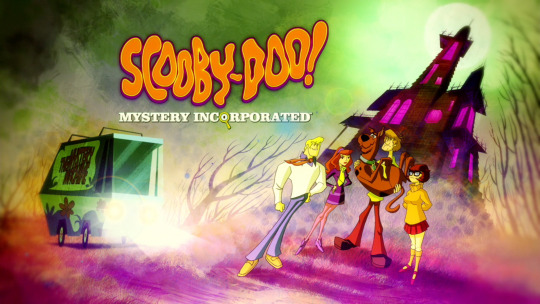
How was it taking the helm of Bravest Warriors for Season 4?
It’s an excellent show—which in itself poses a challenge. Coming in at the 4th season, I had no control over the show’s voice because it long preceded me. Adopting the voice of someone else is always tricky. You have to accept that you’re not that person, and the stories that you tell will be different than those they would. But there’s also the fun of coming into an established world of great characters and getting to play with them in your own way.
What do you like best about Bravest Warriors?
I love its older sensibility. It reflects a darker side than most cartoons for kids. And I like that it’s about teenagers with all their emotional complexity and messiness.
How was your approach to Bravest Warriors specific to you?
I think my interests skew a little differently from the norm. Had they hired someone fanatical about Star Trek and Star Wars, season 4 would have probably been quite like Star Trek or Star Wars. But the focus of the show is four hormonal teenagers in space, so being a fan of teen properties – Dawson’s Creek, Heathers, Felicity, The Hills (I’ll admit to watching the hell out of Pitch Perfect) – allowed the characters to stay in the forefront. I love that in teen shows everything is so dreadfully important—because when you’re that age, it is. When you’re young, the world is a backdrop to your life. As you grow older, your life moves into the background, and the world becomes more important.
Without spoilers… what can you say about the end of Season 4?
I left season 4 with places to go. There are still so many stories to tell, because the show is structured so that you can tell any story. It plays on tropes and inverts them; the characters can only evolve a certain amount, but the world is so big, you’re not going to see the same story twice.
Did adjustments have to be made to ready Bravest for broadcast TV in Canada?
You’d think so, but no, not really. A few words were nixed, but not that many. What’s good is that the show is never uncomfortable or difficult for children to understand. The concept didn’t have to change for broadcast, because really, these are nice teenagers. They’re motivated by love and friendship.
That seems to be a trend in cartoons: more nice characters and positive friendships.
It’s another impact I see from Pen Ward. He introduced a lot of heartfelt positivity to cartoons. Before Adventure Time, there was a lot of silliness, but there wasn’t much kindness. Pen showed that it doesn’t hurt to show happiness. And Bravest Warriors has a lot of that heart too, even with the darker threads, like Jellykid’s apparent hatred of the Warriors and Impossibear’s overall problematic relationships.
What do you love most about each BW?
I love that Danny is born to suffer. He has happy moments, but he had a rough start. Wallow is outrageously optimistic. He finds tragic things funny, which is pretty beautiful. Chris is obligated to live up to this hot, blonde, white male hero that he never asked to be. I like how that sci-fi archetype contradicts the sensitive guy he actually is. And for Beth: she lives so responsibly. She’s clear-headed and takes initiative, but she’s plagued by these teenage emotions that she doesn’t have any use for.
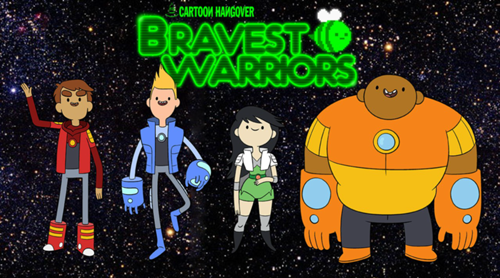
What do you see as the core theme of the show?
It’s love, for sure: romantic love, love for their parents, and overwhelmingly love for each other as friends. And of course it’s also about why loving someone sometimes means that you have to murk them.
Were you told all of the ~mysteries and secrets~ when the show passed to your hands?
I was told a few things, and I honored them. Questions like, “What’s the Emotion Lord about? Who is the Concierge? Is Chris meant to be with Beth or Plum?” All these will all be answered by the end of the season.
What’s been special about working on the show?
Truthfully, I’ll never have this freedom as a writer again. “I’m going to kill myself so hard”—where else will I get to write a line like that?! And the show is special because it’s very much a Frederator show, meaning Eric Homan (VP Development), Kevin Kolde (VP Production) and Kelsey Calaitges (Writer, Writer’s Assistant & Dev. Manager) are hugely important to it. It has Frederator’s unique sensibility, and they care about the property and what it’s achieved. They care about its integrity. That shows.
Last up: what is your favorite cartoon?
My favorite cartoon is Cowboy Bebop. There’s an episode that I can’t watch because it just wrecks me for days after. Brutal.
Thanks for the interview Benjamin! And for readers: watch 2 new episodes of @bravestwarriors tomorrow (Friday 4/19) on @cartoonhangover! Aww yeea.
– Cooper

